Posted: July 4th, 2010 | Author: Devon | Filed under: France, Unexpected Adventure | 6 Comments »
Halbe and I were in a rented car on Saturday, finishing a three-day road trip through the Loir Valley. The plan was to drive to Caen, spend the night, return the car, then on Sunday be picked up to begin a three week stay in a beautiful cider farm in Normandy.
We’re a few hours outside Caen when we receive a mysterious text message from our host at the cider farm, something about “sorry it didn’t work out” and could he help find “someplace more hospitable.” We get our host on the phone, who tells us there was a “miscommunication” and that he did not believe we were actually confirmed. In addition, his father had recently passed away and this was not a good time to come. The whole thing didn’t sit quite right with us, as we had confirmed our stay with him via email a month or so previous. But, what can you do? The man said no.
The cost of a hotel/hostel in France for three weeks would cripple us financially. We took him up on his offer to help find another place. More calls are exchanged, us drawing closer to Caen by the moment. The now non-host connects us to his neighbor who needed help with their curtains. As in, making and hanging curtains, possibly for three weeks. We weren’t sure.
And then we received a call from a cheerful woman named Dorothea. She had been expecting a helper for her B&B but fell through, and was “keen” to find a replacement. It’s a little further down the road, she said, but she could pick us up. She said the main house was full, but we could stay in the farmhouse, and she could take us all three weeks. She gave us her web site to check once we arrived in Caen. We said we’d let her know.
We get to Caen, get a hotel, and load up her site. Here’s the place:
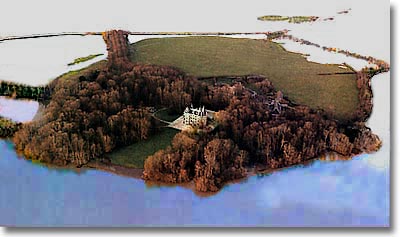
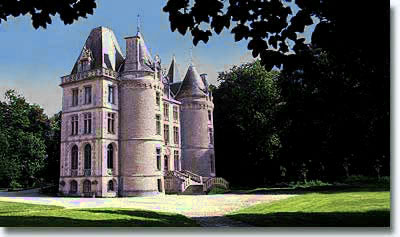
Wow. Alright, looks great. But what about that farmhouse?
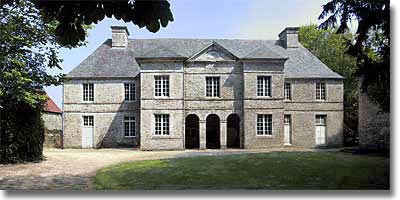
We were sold. We called her back and set up a time to meet later today (Sunday). So, goodbye cider farm, hello magical island in Normandy. We really hope it works out.
And to everyone in the States, happy Fourth of July!
Posted: June 30th, 2010 | Author: Devon | Filed under: Bordeaux, France, Wine | 4 Comments »
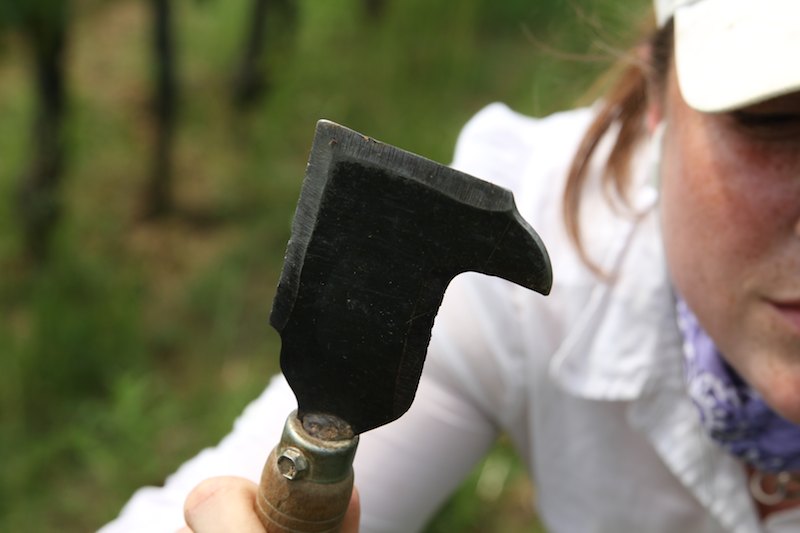
You’d think grape vines would have it easy. The way wine is cooed over by the cultured and wealthy, and labored over by millions of dedicated vintners, then surely their lives must be nothing but sunshine and gentle care, right?
Allow me to introduce a vine knife, held by my lovely wife Halbe. This nasty, hooked blade is one of several torture devices we’ve employed since arriving at our current host. With it we hack and carve the plants, and for what? The idea is this: happy vines make no fruit. Vines beaten to the limit of their survival produce offspring (that’s grapes to us) as quickly as possible.
We start young. Three-year-olds, dude. By now they have decent roots (American, of course) and have grown six to eight long, green vines. They reach out to the sky, flopping in the air like the arms of laughing children. Not acceptable. We spent five days removing these vines from 7,000 baby plants. Halbe preferred the knife, but I just ripped them out with my bare hands. We leave two vines on each, and truss them up with plastic cord, holding them vertical.
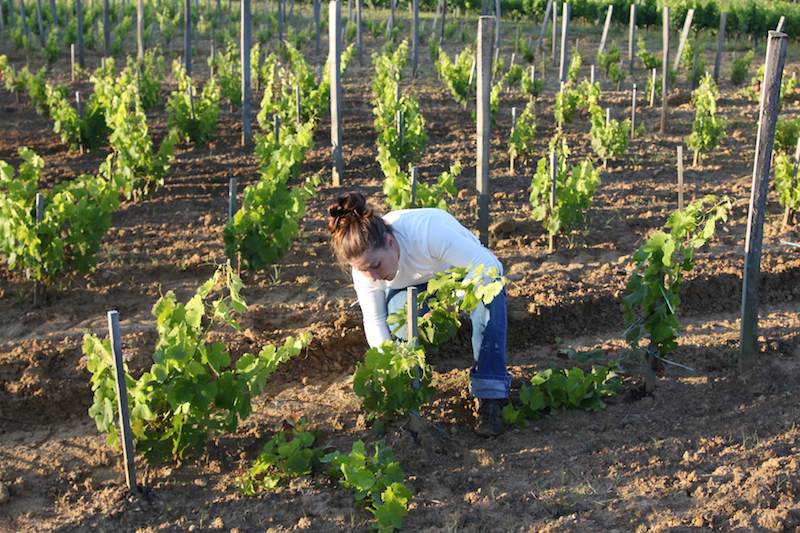
The babies, they don't understand
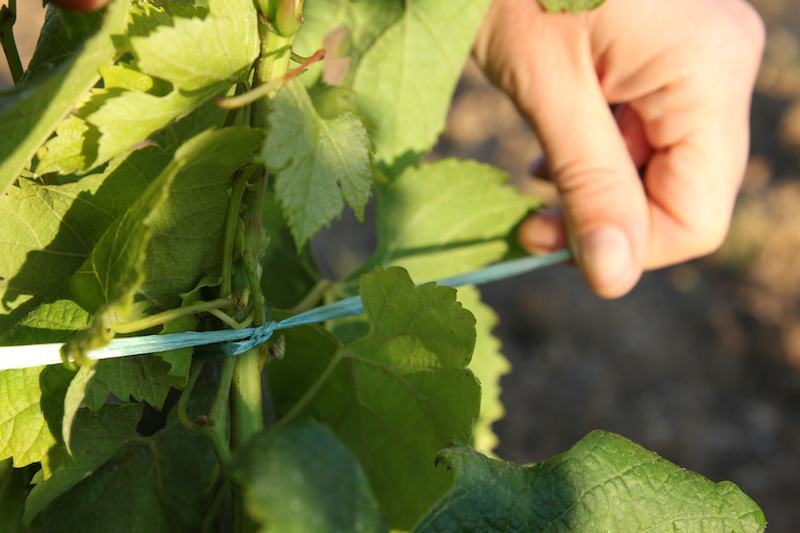
Now, with less vines to support, the roots pump all their goodness into those two remaining, vertically-tied vines, forcing the plant to grow to a better height for picking and further abuse/tending.
Épamprage (eh-pahm-prajsh) comes next. The plants get bigger and eventually produce grapes. They also continue to attempt new vines, from the graft point, from the stalk, and from the head. We hack those off. On some farms, they have a machine to do this. It smacks the vines with strips of rubber tire until those suckers rip off.
What else? Oh yes, if they get too tall, they chop off the tops. You’re not allowed to water them. And, as if to add insult to injury, when they DO grow grapes, some farms do a vert vandage — green harvest — and remove about a third of the immature grapes and throw them away.
It’s a hard knock life, absolutely, but without it, we’d have no wine. Generally speaking, the harder those vines have to work to grow those grapes, the higher the quality of grape and the finer the wine. But not too much pain. After all, a vintner depends on those vines for their own survival.
Posted: June 28th, 2010 | Author: Devon | Filed under: Bordeaux, France | No Comments »
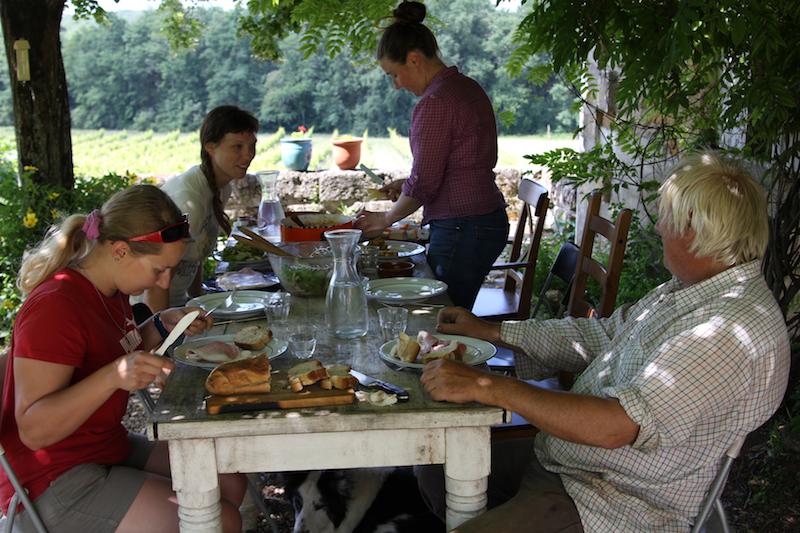
Same table, some different people, different day
I’m sitting at a table in Castillon la Battaille, France, with my wife and two other women. Both are from the United States and both have blogs about traveling in Europe, much like this one. So here we sit, thousands of miles from home, discussing our blogs that we write for the people we know, thousands of miles away.
Their blogs are:
Jenny (in the photo above, back left, white shirt): Moving & Eating
Jenny is into cheese and like us has worked on goat farms. She lives not far from us in SoCal, and has a job very similar to Halbe’s. Today as we tended the vines, she told me about one of the only film ever shot in the constructed language Esperanto, Incubus, starring William Shatner.
Elena (not pictured): Passport? Check!
Elena arrived yesterday to the farm. She grew up in Olympia, Washington, a short drive from where I went to university in Seattle. This evening we did the dishes, and discussed our shared love of Dick’s Hamburgers.
These coincidences are odd and ongoing. Do people in their twenties from the West Coast just particularly like to travel and work on farms?
Posted: June 28th, 2010 | Author: Devon | Filed under: Bordeaux, France, Wine | 4 Comments »
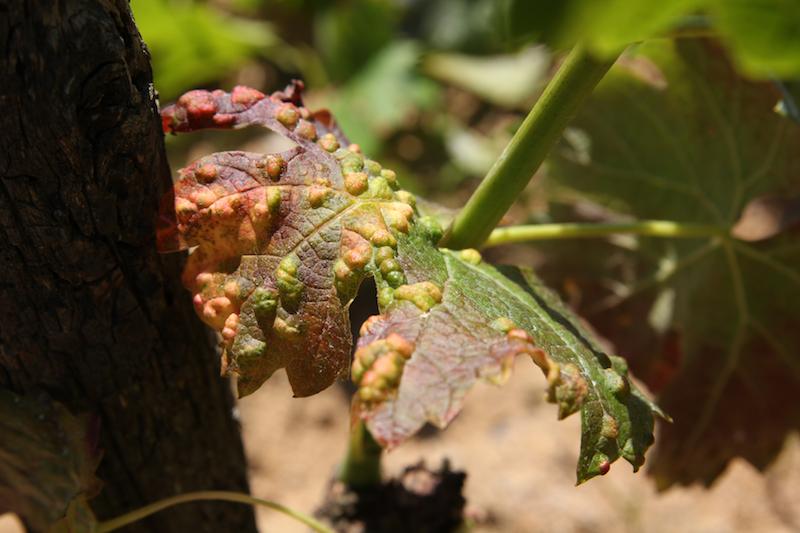
All French wine is from grapes grown on American roots. From the thousand dollar bottle on down to the swill, a little bit of the US of A is in every sip. Here’s why:
In the 1860’s nearly half the vineyards in France had fallen to a terrible blight. Vines, many of them decades old, were faltering, not producing grapes, then eventually dying. No one knew why. The blight lasted for over 15 years, closed over 4 million wineries, and devastated the French economy. The government offered a reward of 320,000 francs to anyone who could cure the problem.
A team of French biologists figured out the cause in 1870: an aphid, introduced from America, called phylloxera. This tiny insect would nest in the leaves (like the one I photographed above), hatch, fall to the ground, and consume the roots of the grape vine, eventually killing the plant.
Knowing the cause was a help, but there was no cure. Farmers tried pesticides and other chemicals. They left frogs under the plants, and let chickens roam the vines with the hope that they would eat the phylloxera. None of these ideas worked. It was Leo Laliman and Gaston Bazille, a team of previously unknown wine growers and viticulturists, who suggested the solution of grafting America’s phylloxera-resistant rootstock on to French vines. Their solution worked, and over the following years there was a great reconstruction of the wineries and their vines, and eventually the wine industry returned to normal.
No cure to phylloxera has been found, and this practice continues today. Every vine I’ve worked on or seen since arriving to France has a graft point near the base. The young vines still have a covering of wax over their graft point, like this:
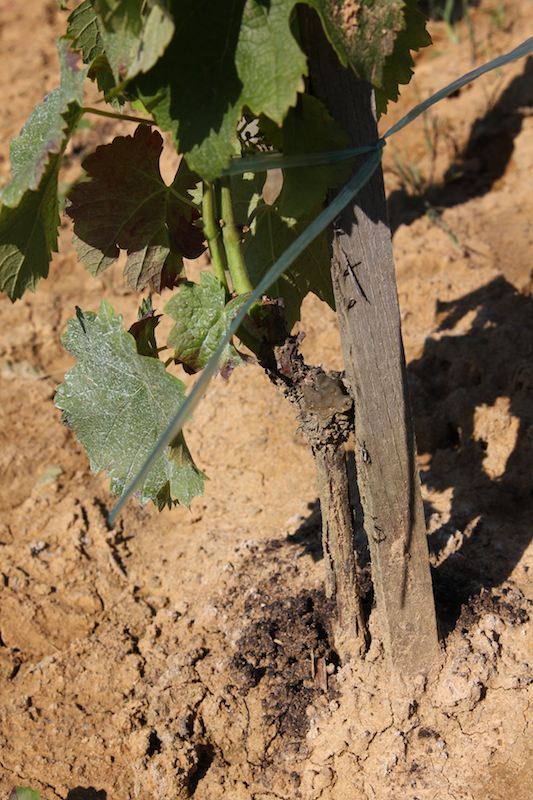
That bark covered stick is a chunk of harvested American rootstock. An inch-long portion of a French vine was grafted on top, and has since grown into several new, green vines. Though the plant will likely contract phylloxera (many vines have diseased leaves like those in the top photo), the plant will remain strong and hopefully produce grapes for decades to come. That American rootstock will also attempt to grow vines, and their removal is one of the common chores on all wineries. In fact, that’s what I spent most of this morning doing with a spade and pruning shears.
As for Leo and Gaston, they did not receive the 320,000 reward. The French government argued they had not cured the blight, but only stopped it from occurring.
Posted: June 22nd, 2010 | Author: Devon | Filed under: Bordeaux, France, Wine | 6 Comments »
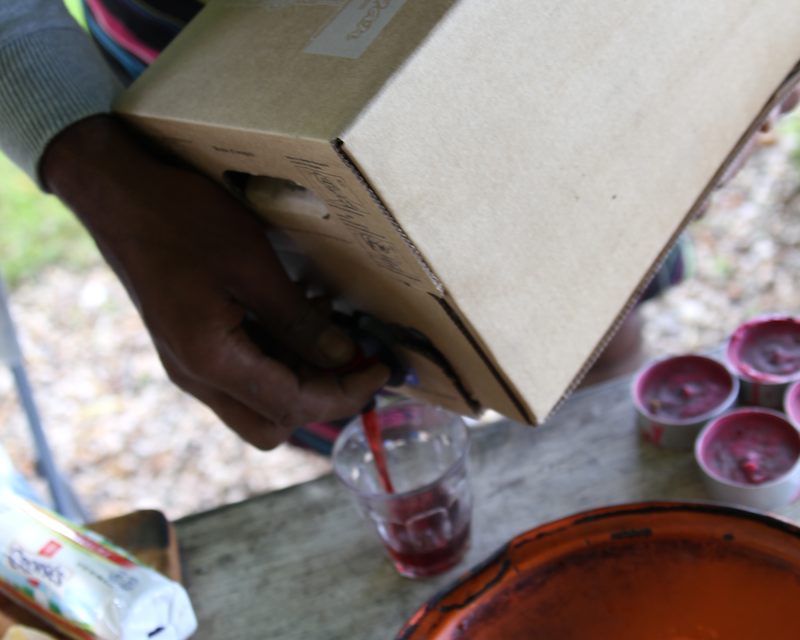
Here we are enjoying box wine from our neighborhood, Cote de Castillon. And the view:
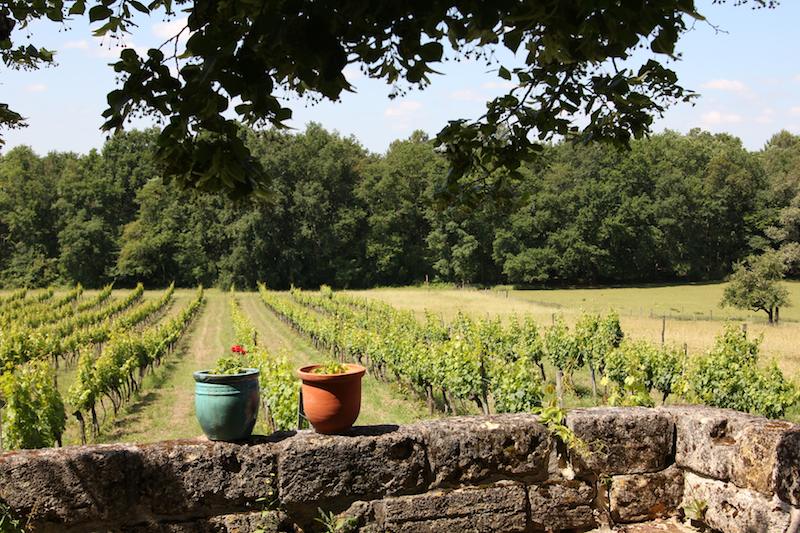
One of the fields of Cabernet grapes.










